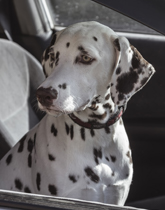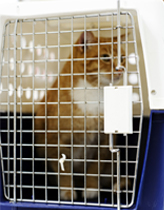Pet Travel Tips
If you’re like most pet owners, you have either considered traveling or have already traveled with your pet, but found the experience to be stressful. West LA Veterinary Group wants to help make traveling easier for pet owners, which is why we’ve dedicated this page to pet travel tips. Whether you plan to travel by plane or in a vehicle—or both—these tips can help you and your pet have a safer, more enjoyable journey.
Pet Car Sickness Remedies
Motion sickness is a common response for pets when they travel in a vehicle for the first time. If your pet experiences car sickness, an over-the-counter medication that is safe to give to dogs and cats is Dramamine (dimenhydrinate). For pets that need prescription strength motion sickness medication, West LA Veterinary Group offers Cerenia, an antiemetic that acts on the central nervous system without causing sedation. If your pet becomes anxious during travel, there are several all-natural remedies available that are veterinarian-approved, such as supplements that contain derivatives of casein (protein found in mother’s milk) and/or L-tryptophan. Royal Canin Veterinary Diet Calm also contains these all-natural calming substances, and, if fed starting a few weeks before travel, can help reduce anxiety in your pet. Adaptil for dogs and Feliway for cats have also been proven to effectively treat anxiety. These products are composed of a synthetic pheromone that mimics your pet’s own natural pheromones which provide a calming effect.


Pet Identification
It is important to make sure that your pet is current on their identification before traveling. We recommend that your pet have both an ID tag on their collar as well as a microchip implanted. A microchip—which is about the size and shape of a grain of rice—is implanted under the skin, between the shoulder blades. Each microchip has a unique bar code that is then registered to that pet and their owner. Most veterinary facilities and animal shelters have scanners to help identify lost pets that have been hopefully microchipped. Proper identification can increase the chances of a lost pet reuniting with their owner. West LA Veterinary Group offers microchipping for your pet, which can be performed during a routine visit to our clinic.
Tips for Flying with a Pet
Before planning on traveling with your pet by plane, please check the airline’s pet policy to make sure that you meet the travel requirements. If your airline or destination requires a health certificate for your pet, the veterinarians at West LA Veterinary Group are accredited to issue both domestic and international health certificates. Some countries (and Hawaii) have other specific regulations and quarantine periods. Pet owners should contact that country’s Consulate or Embassy to find out the pet travel regulations to that country before planning a trip. Another good resource for pet travel requirements is the USDA. It is also important to inquire about potential health risks to your pet when traveling to another state or country. Specific vaccinations and/or anti-parasitics (such as tick, intestinal worm, and heartworm preventions) may be required if your pet is traveling to at-risk areas. A sedative for very anxious pets may be needed during long trips. Once your pet is examined, the veterinarians at West LA Veterinary Group can determine if a sedative is a safe option for your pet and discuss with you the best way to keep your pet healthy when traveling.


Pet Carrier Selection
Always choose a carrier that is comfortable and spacious enough for your pet, regardless of your chosen method and length of travel. As most airlines’ pet policies indicate, your carry-on pet carrier should be large enough for your pet to be able to stand up in and comfortably turn around in, but small enough to fit under the seat in front of you. Make sure the carrier is sturdy and provides sufficient ventilation as well. If you have a cat, consider the two following handouts for how to best prepare him/her for travel in a carrier.
